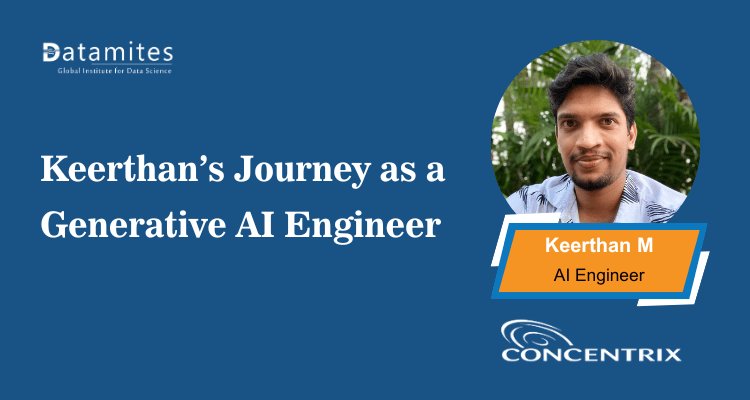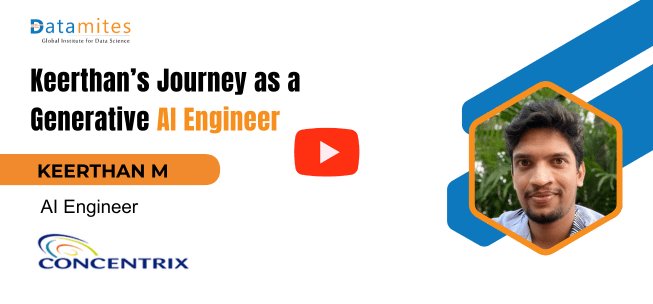Marketing Analyst to Generative AI Engineer: Keerthan’s Inspiring Journey
Keerthan’s career transformation from a Marketing Analyst to a Generative AI Engineer is a testament to adaptability and lifelong learning. His journey highlights how embracing continuous learning and emerging technologies can open doors to entirely new career paths.

From crunching numbers in Excel to building advanced generative AI models, Keerthan’s career transformation is nothing short of remarkable. In just a few years, he went from having zero coding experience to leading cutting-edge AI projects for a global company. His story is proof that with the right training, persistence, and a strong portfolio, breaking into the world of AI is not just possible, it's achievable for anyone willing to put in the work.
Marketing Analyst to Generative AI Engineer: An Interview with Keerthan
Keerthan shares his journey, learning strategies, career growth, and insights into the evolving world of AI.
Q1: Keerthan, could you tell us a bit about your background and career journey?
Absolutely! My journey into AI started back in 2018. At the time, I was working as a Marketing Analyst, primarily handling data analysis in MS Excel without any exposure to Python, SQL, or machine learning.
A colleague and I discovered the DataMites Data Science course, a 8-month program and decided to enroll. The training helped me grasp machine learning algorithms, data visualization tools like Tableau, and practical problem-solving skills.
From there, I moved from my initial role to a Data Scientist position, quickly promoted to Senior Data Scientist. Later, I joined Tech Mahindra as a Lead Data Scientist, and today I’m working at Concentrix as a Manager Generative AI Engineer.
Q2: You had no coding or ML background before. How did you cope with learning these skills while working full-time?
I opted for weekend classes Saturdays and Sundays at DataMites while working Monday to Friday. I dedicated 1–1.5 hours every day after work for coding practice and assignments.
Within one or two months, I started giving interviews, which not only tested my knowledge but also gave me a clear idea of industry expectations. The hands-on projects at DataMites were crucial by the end, I had multiple portfolio-ready projects that helped me stand out in interviews.
Q3: How important are projects in building an AI career?
They’re absolutely essential. I recommend having at least 4–5 end-to-end projects in your portfolio. These should not just show technical skills, but also explain the use case, industry relevance, and impact. In my case, project experience helped me crack interviews more easily.
Q4: You now work in the Generative AI domain. What challenges do you face with LLM-based projects?
One major challenge is model selection choosing between open-source and closed-source LLMs. This decision must consider data security, as sensitive company data should never be exposed to third-party APIs.
LLMs can also hallucinate or provide inaccurate results, so fine-tuning and prompt engineering are critical. We also have to ensure the model consistently meets client expectations while complying with ethical and legal standards.
Q5: Are there any recent advancements in Generative AI that excite you?
Yes, I’m particularly excited about multimodal RAG (Retrieval-Augmented Generation) and agent-based approaches. These enable a single AI application to handle multiple tasks text, audio, video generation by assigning each task to specialized agents. This is opening doors for multi-functional AI systems that can operate more intelligently and efficiently.
Q6: What advice would you give to aspiring AI professionals?
- Invest in foundational skills — Python, SQL, machine learning algorithms.
- Work on real projects and be ready to explain them end-to-end.
- Keep learning — AI is evolving rapidly. Stay updated with tools, models, and best practices.
- Focus on ethical AI development — data security and compliance are non-negotiable.
Refer these below articles:
- From Learner to Leader: Chandan’s Inspiring Journey as an AI Lead
- Divya’s AI/ML Journey: From Learning Python to Leading AI Projects
- From Learning to Leading: Priyanka’s Take on AI-ML Trends and Careers
Key Takeaways from Keerthan’s AI Career Journey
- Career Transition Success – Keerthan moved from a Marketing Analyst role with no coding or ML background to becoming a Manager – Generative AI Engineer at Concentrix.
- Training Foundation – An 8-month DataMites Data Science course provided him with essential skills in machine learning, Tableau, Python, SQL, and problem-solving.
- Balancing Work & Learning – Managed full-time work and learning by taking weekend classes and dedicating 1–1.5 hours daily for assignments and coding practice.
- Interview Preparation – Started interviews within 1–2 months of training, gaining insights into industry expectations and strengthening his skills.
- Importance of Projects – Emphasizes having 4–5 end-to-end projects in a portfolio, explaining use cases, relevance, and impact to impress recruiters.
Read these below articles:
- Human Intelligence vs Artificial Intelligence: Key Differences and Insights
- What is Semantic Networks in Artificial Intelligence
- Agentic AI vs Generative AI: What’s the Difference?
Keerthan’s journey is a testament to how upskilling with the right training program can transform a career. From marketing analytics to leading generative AI projects, his story shows that with dedication, practical learning, and adaptability, anyone can break into AI.
Pune has rapidly emerged as one of India’s leading technology and education hubs, making it a prime destination for learning Artificial Intelligence. With Pune’s thriving startup ecosystem and presence of major IT companies, completing an Artificial Intelligence Institute in Pune can open doors to high-paying AI roles such as AI Engineer, Machine Learning Specialist, Data Scientist, and AI Researcher.
DataMites offers an equally thorough Artificial Intelligence Institute in Chennai aimed at equipping learners for success in the AI field. To accommodate different learning styles and needs, the course is available in multiple formats: classroom training at centers in Anna Nagar, Guindy, and Perungudi; live online sessions for remote learners; and self-paced pre-recorded modules for those who prefer flexible scheduling.

